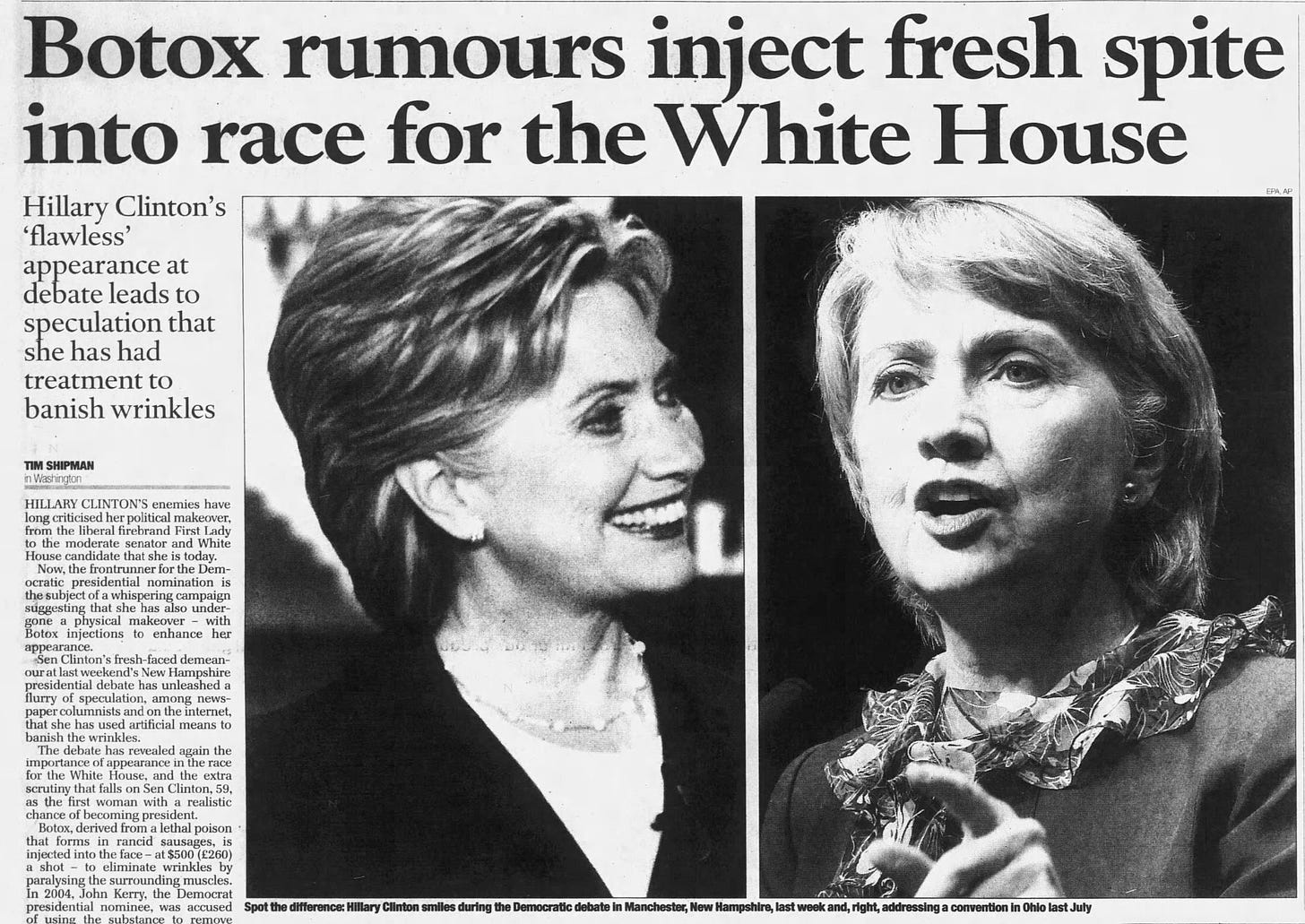When Nothing is Real, Everything Is Possible
Especially a lot of bad stuff.
It is unclear whether the Guinness Book of World Records has a category for “most humiliating moment for a teenage boy,” but if it did, it would have occurred at a press conference in Oakland, California on November 20, 1990.
On that fateful day, then-14-year-old David Stalder sat at a desk with his mother, Sheila, announcing their lawsuit against the pop duo Milli Vanilli for having lip-synced their Grammy award-winning album, Girl You Know It’s True. Sheila said she had bought the cassette for her son, but that he felt “hurt and cheated” when he found out the French-based duo, Rob Pilatus and Fabrice Morvan, actually weren’t the voices he heard on the album.
For a boy barely into his teens, it is unclear what counted as the most horrifying aspect of this media charade. Was it the admission that your mother buys your music for you? Or that you and your mom know so little about the entertainment industry that you decided to sue because you felt “bilked” by the group?
Regardless, seeing the two of them together, proudly declaring Milli Vanilli to be criminals was the height of cringe. Stalder should have taken his mother to court for making it impossible for him to ever see a naked woman.
Sadly, the mother-son duo was attempting to cash in on a fever that gripped the nation after Pilatus and Morvan admitted the vocals on the album were not theirs. They were forced to return their Grammy, and some groups of consumers gathered to destroy their Milli Vanilli albums by steamrolling them. (Side note: For the people who claim the world was better before the internet, this is the type of dumb shit bored people did before they could harmlessly sit on TikTok all day.)
Most outrageously, lawmakers began jumping on the anti-Milli Vanilli press bandwagon, with representatives in Massachusetts, New Jersey, and New York introducing legislation to ban lip-synching in the name of “consumer protection.” Needless to say, politicians criminalizing deception would be like the band Poison banning hairspray.
It has been almost 35 years since the Milli Vanilli scandal took place, but there are still lessons to be learned from the whole imbroglio. For one, when something seems too good to be true, it almost always is. The chance two impossibly beautiful male models could sing like Teddy Pendergrass is infinitesimal - especially given the thick European accents they displayed in their interviews.
Somehow, these guys who could barely speak English demonstrated Motown-style chops when they sang? C’mon. The people who believed this also probably believed Barry Bonds hit a record 73 home runs at age 36 without the help of human growth hormone. It is amazing what we are willing to blind ourselves to when we so desperately want something to be true. As the saying goes, “lies take the elevator while the truth takes the stairs.”
But more importantly, even if the Pilatus and Morvan lip synched and lied about it…who cares?
The entire entertainment industry is predicated on visual and aural sleights-of-hand. Male action stars wear shoe lifts to make themselves seem taller and load themselves up with steroids to play superheroes. Studios apply digital filters to female movie stars, making them seem 20 years younger (and often unrecognizable.) Recently, schlock filmmaking legend and gay icon John Waters said he was fine with straight actors playing gay roles, noting gay actors had been playing straight roles forever.
“I think that everybody should be able to play anything,” Waters said. “It’s called acting. That’s the thing. You become something you aren’t. That’s the whole point.”
The whole purpose of entertainment is to make you feel a certain way - to have your brain cells fire in a different way than they were before to move you to a different emotional location. The people who enjoyed Milli Vanilli’s music weren’t “duped” - they showed up at concerts to see two comely Euros dance to catchy songs, and they got what they paid for. (And there were more of them on their debut album than you remember.)
The feelings people experience while watching something they love are not “fake,” even if the performance’s undergirding might be suspect. Does the fact that Fab and Rob weren’t singing cancel out a fun, sweaty night of dancing? Or the friends you may have met at a show? Of course not. As long as the emotional place they moved you to resonates with you, their performance had value.
As American poet and music critic Hanif Abdurraqib says in a recent documentary about the Milli Vanilli scandal, “All of the answers about how pop music is made rest in this story. What we want to believe our pop musicians to be, versus what they actually are. But that is what pop music is supposed to do. It’s supposed to take us to an elsewhere. Even if we say ‘these people deceived the public,’ so fucking what? Who was this harming?”
(As a wannabe hipster, let me stop here and offer up the caveat that I can’t endorse the Milli Vanilli album as the height of song making in the 1980s. It is fun, sure, but let’s not get crazy. I have a reputation to uphold.)
So misleading entertainment can be good when it stays in the pop culture realm. But there is also a dark side. When people start to use more serious things as their entertainment outlet, the misleading and fraudulent things we accept in music and movies can affect the way the real world works.
Of course, this has happened in the world of politics, which is now harming America in a significant way. Republicans picked an entertainer, former reality show host Donald Trump, as their standard-bearer in 2016, and have treated Congress and the presidency as entertainment ever since.
Consequently, people treat Trump as they did Milli Vanilli. Even though he is a fraud, he is an entertaining fraud. He transports them to a place where they can do or say whatever they want without having to worry about conventions of politeness or telling the truth.
As I have written in the past, Trump is being held to the standards of a celebrity, not to those of a U.S. president. Never has any American politician caused so many people to turn his success into their whole personality, Swiftie-style. This is why his fans adore him as if they are teenage girls (and some boys) and the inner circle of Team MAGA is a boy band. (“Steve Bannon is the cutest!”)
The same sleight-of-hand that works in music and movies now works in politics; just as pop culture can take one to a different time and place, politics-as-entertainment can now allow giant swaths of Americans to construct their own realities, even if none of it is based on anything true. In this alternate world, Donald Trump is going to build a wall to keep Mexican rapists out, the deep state is constantly conniving to get their guy, and Trump is a good father and devoted Christian.
Let me say it again: it is amazing what we are willing to blind ourselves to when we so desperately want something to be true.
But making politics our entertainment has real world implications. Arguing about which Star Wars reboots is best can be intense, but it is ultimately harmless. Electing a fraud to the presidency affects America’s standing in the world, how citizens are treated, and sometimes whether people live or die. Lies aren’t adorable, they can be catastrophic.
So ease up on the entertainment industry; sometimes, people don’t tell the truth, but as long as it is in service to fun and storytelling, it is simply part of the game of misdirection. Just understand that harmless deceit takes a dangerous turn when we consider politics our entertainment. (And it is only going to get worse as people can create their own AI photos and videos, tricking the most gullible Americans.)
The point of all this is clear: Do not let your mother buy your music for you, and do not let her tell the nation that she did so. Even if she is super cool and bought you some Velvet Underground or Ramones, that would make her the most sought after mom in America, and you would have a “Stifler’s mom” situation on your hands. Either way, you’re in deep trouble.
ALSO:
Speaking of things that are imaginary, we have to discuss a verboten topic that nonetheless has a profound effect on our democracy. I am talking, of course, about Joe Biden’s cosmetic surgery.
When women get work done, media outlets often have no qualms about discussing it openly. Here are a couple headlines merely speculating that Hillary Clinton was considering getting a little revitalization (including Botox):
Male politicians are probably more vain than female politicians. Ron DeSantis famously wears ten-inch heels to make himself look six feet tall (give or take). If congressmen stopped dyeing their hair jet black, Just for Men would go out of business.
Which brings us to Biden’s facelift, which saw him lose the full equivalent of a Jonas Brother from his face. He went from having jowls like Droopy the Dog to suddenly having a face tight enough that if you threw a peanut at him, it would bounce back so fast it could kill you.
Compare and contrast:
Make whoever did his work U.S. Surgeon General, because that is a miraculous glow-up.
Anyway, while this may seem petty, it actually makes a difference in how Biden is viewed. He is an 81-year old man with the face of a man in his 60s.
And that is why it is so disconcerting to see him amble around like a man who was born before D-Day. His whole schtick these days is to portray himself as young and vigorous. But what if he actually looked like he should look at age 81? What if he had aged naturally, forgoing the hair plugs, the skin tightening and the filler? Could he have actually made it this far in the 2024 presidential race without undergoing Jennifer Aniston’s daily skin routine?
Side Note: At some point, cosmetic surgery is going to become so advanced, people in their 70s are going to be indistinguishable from people in their 20s. So we will have people who look like Sydney Sweeney dropping dead as they are just walking down the street because they are actually 90 years old.
ALSO:
I have plenty of thoughts on Caitlin Clark, but I can’t talk about women’s basketball in every one of these things, so it will have to wait.
ALSO:
My National Review column last week (which may have driven some of you here) made a lot of people very angry. In it, I discuss Trump’s 34 felony convictions in Manhattan and how a lot of Republicans are using the weakness of Alvin Bragg’s case to exonerate Trump of everything he has done in his life.
But it’s not quite that easy. As I say:
The Bragg case allows Republican leaders to cling to a single thread (“writing checks to cover up an affair isn’t illegal, much less a felony”) while ignoring the entire tapestry of Trump’s misconduct over the years. For these defenders, backing Trump is a bloodless calculation: Defending the former president is like breaking the speed limit — if everyone on the highway is doing it, then nobody gets pulled over.
Looked at another way, keeping Trump viable is like being a sports fan. To members of Congress and other GOP notables who’ve sold out their principles just because their guy needs a win, Trump is Caitlin Clark, unfairly under attack from the dark, liberal forces of the WNBA. Only in Trump’s case, his fans’ political futures depend on his success.
If you’re so concerned about Trump’s dubious felony convictions that you’re able to ignore the entirety of his behavior over the past eight years, your moral sextant has been thrown overboard and now lies at the bottom of the ocean beside the scary, bug-eyed fish with fiber-optic lights protruding from their foreheads.
You can read the full thing for free here at this gift link.
FINALLY:
Glasgow, Scotland’s Camera Obscura was probably the best chamber pop group of the first decade of the 2000s, filling their songs with soaring violins and perfectly catchy hooks. (If you don’t believe me, listen to “Let’s Get Out of This Country,” one of the best songs of the decade.)
After what seems like a decade hiatus, the band is back (and currently touring America) with a new album that gives more country/folk than it does orchestra. For a band that has been gone for so long, it is a surprisingly strong effort. Check out “Big Love” here:








